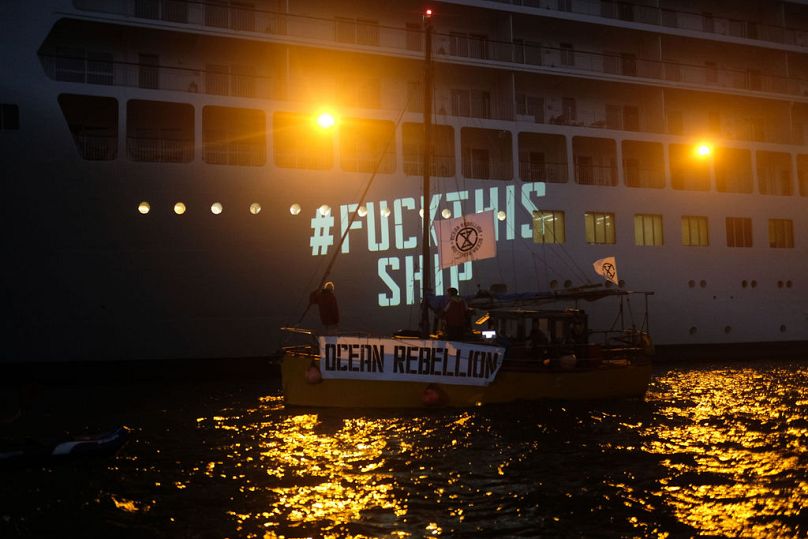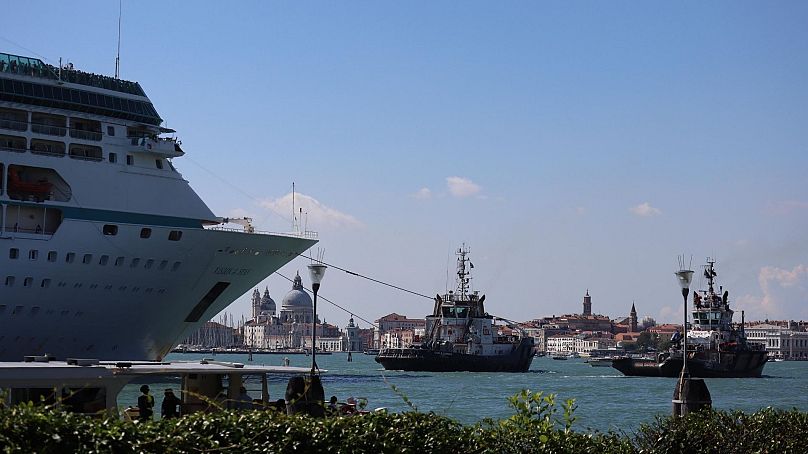The ship has been pumping out tonnes of pollution in a harbour in Cornwall, UK according to local residents.
A group of 40 protestors from a local Extinction Rebellion group in Cornwall, UK has taken to the sea to protest the environmental impact of cruise ships.
Calling themselves Ocean Rebellion, the activists targeted a cruise ship docked in Falmouth harbour. They surrounded The World in small boats and projected slogans onto its hull, including “Sort your ship out!” and “#F**kthisship”. According to local residents, the cruise liner has been pumping out tonnes of pollution since it docked there in May.
The World is the first-ever residential cruise ship with hundreds of apartments on board. The exclusive ship is usually home to a group of multi-millionaires who permanently travel around the world voting on which destination to visit next.
Currently, though, the floating city is empty aside from the crew and has been sheltering in Falmouth harbour over the last few months due to the COVID-19 pandemic. “Even during the hottest days of lockdown the ship was pumping out tonnes of smoke into the local atmosphere,” said one local resident. “You could see it black in the sky and smell it in the air.”
A spokesperson for the group said that “the fuel this ship burns is 100 times more polluting than the fuel we allow on roads.”
“This is having a huge environmental impact not just on the oceans and their ecosystems but on air quality in the coastal communities visited by these ships.”
When idling in the port, the cruise liner produces emissions equivalent to 1018 trucks every day, says Ocean Rebellion.
“Each apartment on this cruise ship has a hundred times more emissions than the average European land based equivalent. That’s 380,309kg CO2 per year – that’s the weight of a Boeing 747 airplane.”
The group has pledged an “escalation of activities” in the near future to protect our common ocean heritage.
The impact of cruise ships around Europe
The popularity of cruises has been growing in Europe over the last ten years with around 7 million passengers embarking at ports in 2018. It is one of the largest cruise markets in the world and residents of cities where ships frequently dock have been growing increasingly concerned about the industry’s impact on the environment.
A report from last year from non-profit, Transport & Environment (T&E), found that the world’s largest cruise company emitted 10 times more sulphur oxide in Europe than the entire continent’s passenger vehicles combined.
Sulphur oxide is one of the main pollutants from cruise ships alongside nitrogen oxide. According to the European Environment Agency, both of these substances can lead to acid rain which has adverse effects of ecosystems in lakes and rivers as well as causing damage to forests.
Emissions of sulphur oxide can also make conditions like asthma worse, reducing lung function and leading to inflammation of the respiratory tract.
“Luxury cruise ships are floating cities powered by some of the dirtiest fuel possible,” said Faig Abbasov, shipping policy manager at T&E when the report was released. “Cities are rightly banning dirty diesel cars but they’re giving a free pass to cruise companies that spew out toxic fumes that do immeasurable harm both to those on board and on nearby shores. This is unacceptable.”
Some popular city destinations suffer more than others, like Venice. In 2017, 27,520kg of sulphur oxide was emitted by cruise ships in the city compared to 1,362kg by cars.
It recently banned large ships from its historic centre after concerns were raised about the erosion of building foundations from the waves they create. Venice is now considering a move to “intelligent tourism” with limits to numbers of tourists, many of whom arrive on these vast cruise liners.













